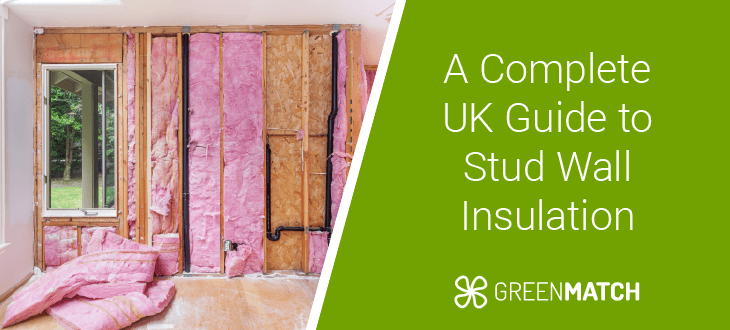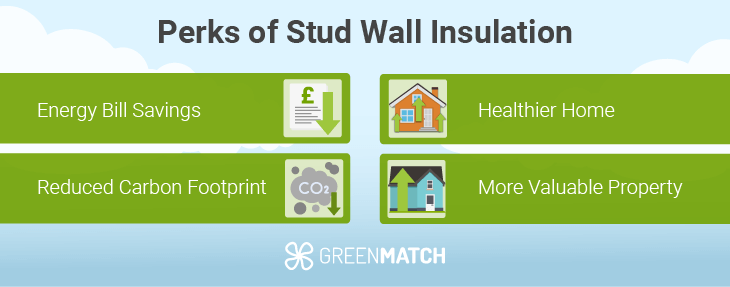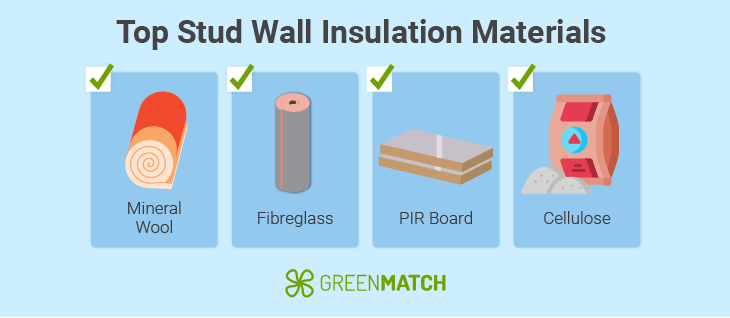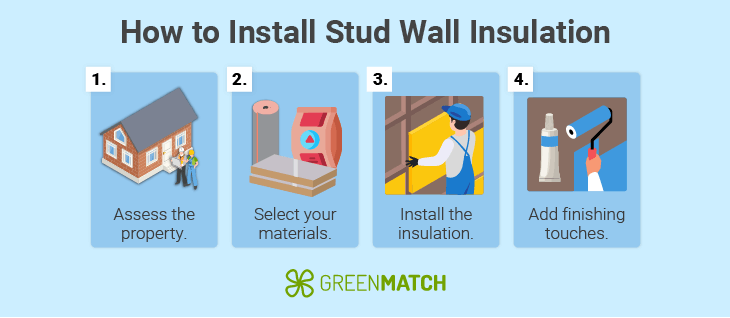Answer these simple questions and we will find you the BEST prices
Which type of solar quotes do you need?
It only takes 30 seconds
100% free with no obligation

Get Free quotes from insulation specialists near you

Save money by comparing quotes and choosing the most competitive offer

The service is 100% free and with no obligation
- GreenMatch
- Insulation
- Wall Insulation
- Stud Wall Insulation
Stud Wall Insulation: Benefits, Types & How to Install It


- Stud wall insulation is a method of insulating walls from within the property. It involves constructing a faux wall in front of your home’s inner walls and filling the space between with insulation material.
- Stud wall insulation is the most suitable approach for solid wall properties without a cavity space in their walls.
- An average internal (stud) wall insulation for a semi-detached UK home costs around £7,500 for a full job.
Do you live in a solid wall property and want to upgrade your thermal efficiency? Then stud wall insulation might be the approach for you. Uninsulated walls are responsible for up to 33% of heat loss in a home, leading to soaring energy bills, a huge carbon footprint, and a negative environmental impact.
Internal stud wall insulation creates a seamless solution for such uninsulated properties that is both cost-effective and thermally efficient in the long run. This ultimate guide by GreenMatch UK will provide all you need to know about insulating house walls when they are stud walls.
Ready to insulate your walls? Let GreenMatch UK be your one-stop solution for all your needs. Instead of spending countless hours online, spend just 30 seconds filling out our online form and receive up to 3 free home-tailored quotes from our network of installers. Click here to begin!
- Describe your needs
- Get free quotes
- Choose the best offer
It only takes 30 seconds



Benefits of stud wall insulation

Stud wall insulation is a home upgrade with a wealth of benefits to consider. From big bill savings to sustainable living, let’s have a look at some of the key benefits you could enjoy:
- Energy bill savings: Full internal (stud) wall insulation in a typical semi-detached UK home can save up to £320 in annual energy bills. This is because your energy system will no longer need to work overtime to constantly maintain an internal temperature.
- Reduced carbon footprint: In addition to financial savings, internal stud wall insulation creates significant carbon savings. A semi-detached UK home can slash its CO2 emissions by up to 0.9 tonnes a year, benefitting the planet at large.
- Healthier home: Stud wall insulation greatly helps solid wall properties with temperature and moisture regulation, creating a much more liveable home environment. In addition, the cleaner air and eliminated risk of mould helps prevent respiratory illnesses.
- More valuable property: Solid wall properties are often difficult to value properly in the housing market due to the burden of heating. Stud wall insulation can maximise the value of your property, benefitting you if you ever choose to rent or sell your home.
To ensure you enjoy the most out of insulation for stud walls, it’s highly recommended to work with a professional installer who can deliver top-quality services that’ll serve you for decades to come.
What insulation materials are suitable for stud walls?

Several suitable materials can be used to insulate stud walls, due to their composition, thickness, cost and other factors. Here’s a summary of the most popular stud wall insulating materials on the market today:
- Mineral wool: Made from purposed rock or glass, mineral wool comes in blankets or batts and makes for great stud wall insulation. Generally considered sustainable to product and with properties such as flame and mould resistance, it’s no surprise mineral wool is such a popular option. A key reminder, it’s important to handle mineral wool with safety gear as it can irritate skin and cause respiratory issues if inhaled.
- Fibreglass: Similar to mineral wool but more affordable, fibreglass is sustainably made from recycled glass products that have been spun into sheets of wool-like consistency. Boasting a decent thermal efficiency, flame resistance and much more, it's a great choice for stud wall insulation. Much like mineral wool, handling fibreglass requires protective gear to avoid skin irritation and respiratory problems.
- PIR board: Made from a synthetic polymer called polyisocyanurate, PIR boards are rigid insulation sheets that pack remarkable thermal efficiency. They’re also flame, smoke, and mould-resistant, making them perfect options for stud walls. As a downside, PIR is a synthetic that cannot be disposed of and requires a lot of energy to produce.
- Cellulose: This loose-fill insulation is made from recycled paper and wood products, making it an entirely sustainable material that can be recycled and disposed of safely. Additionally, cellulose is one of the most budget-friendly materials on the market.
As this is not an exhaustive list of insulation for stud walls, consulting with a professional installer can help you make the best decision tailored to your particular needs.
What is the best insulation for stud walls?
There is no single best insulation for stud walls, as your choice will depend on a range of factors such as your budget range, type of home, stud walls, and much more. However, the most popular insulation material for stud walls and other insulation upgrades is often mineral wool.
This is because mineral wool insulation tends to be quite affordable, yet delivers an impressive thermal efficiency. It also boasts properties such as flame, smoke and mould resistance, as well as being sustainably made and easy to recycle.
To make the best material decision tailored to your home, it's highly recommended to work with a professional installer who can assess your property and create the best course of action. However, finding the right installer isn’t always easy. Until now.
With GreenMatch UK, say goodbye to endless hours of research and vetting. Spend just 30 seconds filling out our online form to receive up to 3 free home-tailored quotes from our network of pre-vetted installers. No costs, and no obligations. Click below to begin!
- Describe your needs
- Get free quotes
- Choose the best offer
It only takes 30 seconds



Stud wall insulation cost
The average cost of stud wall insulation for a typical 3-bedroom semi-detached home in the UK is around £7,500 for a full job. Partition wall insulation may cost differently depending on the sizer of the wall. However, your final investment may differ depending on your chosen insulation material, home size, outstanding repairs, etc.
Here’s a breakdown of stud wall insulation material costs per m2:
| Insulation material | Cost per m2 |
|---|---|
| Mineral wool | £13 - £17.5 |
| Fibreglass | £10 |
| PIR board | £5 – £15 |
| Cellulose | £10 - £12 |
Ultimately, the best choice you make relies on your property. Working with a professional installer can help ensure that you make the choice most suited to your needs.
How to choose the right stud wall insulation material
Choosing the right insulation for internal stud walls hinges on factors such as your wall type, total surface area, stud wall gap, stud wall insulation building regulations, and much more.
There are some factors when installing insulation for partition walls that you can be mindful of when deciding to ensure you land the best choices.
Here are some important considerations to make:
- Insulation thickness: What thickness insulation for stud walls is needed? To meet requirements, you'll need at least 120mm of mineral wool or 100mm of PIR board or similar rigid insulation. Insulation building regulations expect a certain u-value to be achieved by your insulation. U-value tells us the rate of heat transfer, so a lower u-value means that a material is better at retaining heat.
- Purpose: You may also consider stud wall sound insulation alongside your thermal upgrade. For a combination of both materials, it is recommended to consult a professional installer who can tailor the most effective course of action.
- Stud wall gap: Since stud walls are built from the inside of your home, they have a panel gap between your original wall and the new stud wall. This is where insulation material will be placed. It’ll have to be wide enough to accommodate insulation, as well as an air gap to reduce the risk of moisture ingress.
- Budget: As a rule of thumb, materials that are more expensive per m2 tend to have better heat retention properties, therefore you must consider your budget when making a decision. More thermally effective materials may cost more, but you’ll be able to get away with less thickness.
- Sustainability: With the sea of insulation materials available today, it’s easy to get lost in all the options. Aiming for more sustainable and ecologically friendly materials will not only benefit the environment but also your health by reducing the risk of toxic fumes and inorganic compounds in your home.
How to install stud wall insulation

Installing stud wall insulation is a relatively straightforward process, but takes place entirely from within your home. For this reason, you should expect some degree of disturbance to your daily routine. While it is possible to tackle this project yourself, professional installation ensures optimal results and quality workmanship.
Here's a general overview of the process:
- Assessment: A professional will assess your specific needs, considering factors like climate, room usage, and existing insulation you may have in your stud walls.
- Material selection: The right insulation material is crucial for longevity. Common options include fibreglass batts and rigid foam boards. An installer will tailor the right choices based on the factors of your property.
- Installation: The installer will carefully remove any obstacles (plasterboard and hinges), install the insulation material, and seal any gaps to prevent air leaks. This process might also require addressing outstanding repairs to prevent issues with your insulation down the line.
- Finishing touches: Once the insulation material is snugly in place, any removed fixtures, outlets, and switch plates will be reinstalled for a seamless finish.
Since stud wall insulation is a relatively invasive process, you may want to tackle the project room by room to leave the rest of your home mess-free and habitable. It’s also highly recommended to work with a professional installer that’ll make sure the job is handled professionally, and in the least amount of time possible.
However, finding the right installer can sometimes feel like a losing game. With the endless options on the market, prospective customers often find themselves stuck in an endless loop of research and vetting of professionals. That was until GreenMatch UK.
With our services, all it takes is a 30-second online form to receive up to 3 free home-tailored quotes from our network of professionals. The best part? There are no charges or obligations. Simply click below to begin and let the bargains come to you!
- Describe your needs
- Get free quotes
- Choose the best offer
It only takes 30 seconds



FAQ
It is worth insulating stud walls, as this will help slash up to 33% of heat loss in your home, reflected in massive energy bill savings, CO2 cuts, and a more temperature-regulated home that is comfortable and healthy to live in.
The most common stud wall insulation materials are mineral wool and fibreglass. This is often due to their cost-to-performance ratio, availability, and relative sustainability.
The cheapest way to insulate stud walls would be to carry out a DIY job. However, poor workmanship can quickly turn a home upgrade into a financial nightmare of burdensome repairs. For this reason, it’s recommended to work with a professional installer even if it may cost more to do so.
To insulate a stud wall, a professional will assess your walls’ conditions and tailor the best course of action. This is then followed by the removal of all obstacles in the room, the installation of insulation material, and the re-covering of the walls for a seamless finish.

Akif is a copywriter at GreenMatch since 2023. With a keen interest in community sustainability, green solutions and the role of digital media in identifying climate trends, he aims to hone in on his background in International Studies and Digital Media to provide a multidisciplinary approach to written content rooted in credible research and accuracy.
We strive to connect our customers with the right product and supplier. Would you like to be part of GreenMatch?

- Stud Wall Insulation: Benefits, Types & How to Install It
- Benefits of stud wall insulation
- What insulation materials are suitable for stud walls?
- What is the best insulation for stud walls?
- Stud wall insulation cost
- How to choose the right stud wall insulation material
- How to install stud wall insulation
- FAQ
